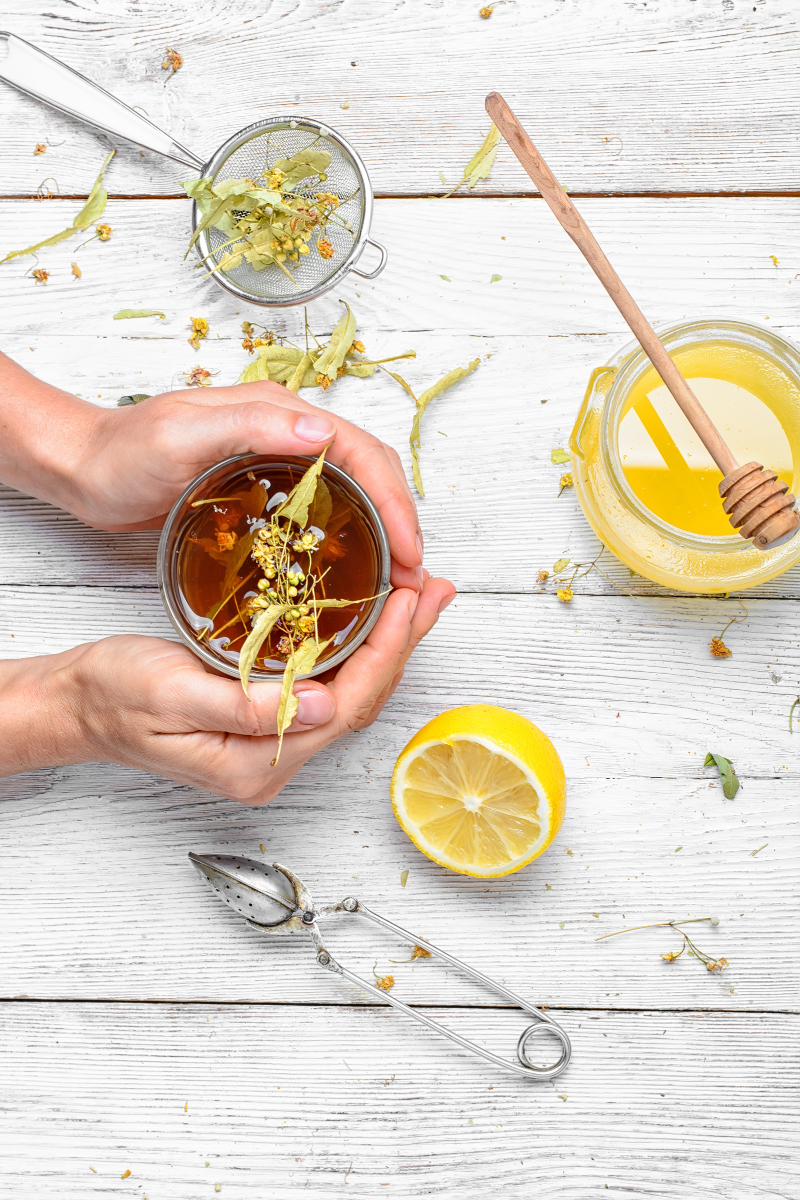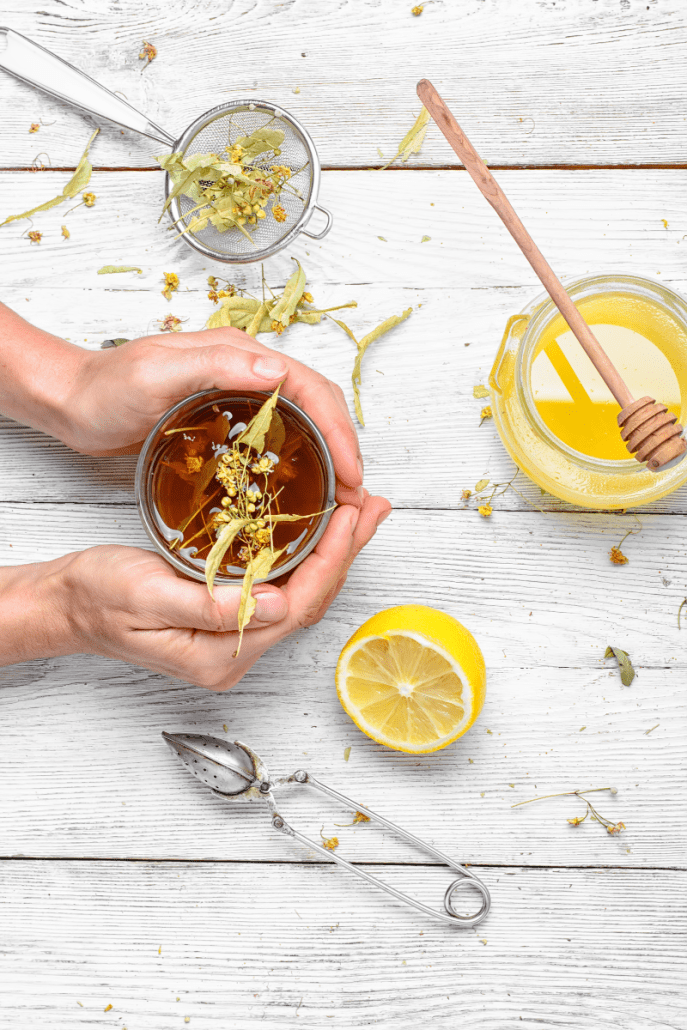
There used to be a time I would dread the first sign of spring. The itchy throat, watery eyes and constant sniffles had me scared to be outside. If you suffer with seasonal allergies, I know you get it.
Thankfully, I don’t feel this way anymore! I made peace with springtime allergies (without medication) and can once again enjoy this amazing time of year!
Because seasonal allergy symptoms are so common, we tend to think it’s completely normal to experience them. Especially when 26% of adults and 19% of children report having them (according to the Asthma and Allergy Foundation of America). This percentage doesn’t even account for those who experience perennial allergies (or chronic, year-round allergies).
The most common treatments for both seasonal and perennial allergies include avoidance and antihistamines, but do these therapies get to the root of the problem — which is often high inflammation in the body? Nope, they sure don’t.
Let’s take a closer look at how inflammation in the body contributes to allergy symptoms, and what we can do about it.
What Is Inflammation, Exactly?
There are two primary types of inflammation in the body: acute and chronic. Acute inflammation is both normal and beneficial; it’s the immune system’s way of protecting us from foreign invaders (like chemicals, pathogens, harmful microbes, and other irritants) — and healing the body after illness, infection, trauma, or injury. Normal signs of acute inflammation include swelling, pain, redness, and heat, which protect the injured or inflamed area until we’re healed.
Chronic inflammation is much more complex. This refers to long-lasting inflammation in the body that builds up slowly and silently over time.
Chronic inflammation can develop as a result of:
- Ongoing exposure to harmful irritants and foreign invaders
- Acute inflammation that occurs repeatedly
- Autoimmune and autoinflammatory diseases
- Hormonal imbalances
- Dysbiosis in the gut
- Mitochondrial dysfunction
- Insulin resistance and high blood sugar
- Increased oxidative stress
- Diets high in inflammatory foods
- Obesity and high body mass index (BMI)
- Cigarette smoking and excessive alcohol consumption
- Environmental factors (e.g. pollution, ozone, and pesticides)
In other words, chronic inflammation is the result of an overburdened immune system. Each of the risk factors listed above results in low-grade inflammation, contributing to the development of chronic disease.
It’s helpful to compare an overburdened immune system to a pot that’s way too full. Eventually, the pot gets so full that it boils over and chronic symptoms, illnesses, and conditions can occur. Allergies and allergic diseases included!

The Link Between Inflammation & Seasonal Allergies
When our bodies become overburdened from years of chronic low-grade inflammation, our immune system may start to recognize potentially harmless substances as threats. So when we come into contact with a foreign invader (think mold spores and other seasonal allergens such as tree, weed, and grass pollen), it can trigger an allergic reaction (e.g. sneezing, nasal congestion, swollen eyelids, fatigue, and nasal discharge).
While seasonal allergy symptoms are typically not life-threatening, they can be incredibly annoying. And while it’s true that taking antihistamines and avoiding potential triggers during allergy season may alleviate symptoms in some people, these treatments don’t get to the root of the problem: chronic inflammation.
What’s more, avoiding potential triggers during allergy season means keeping your windows closed and staying indoors rather than taking in a healthy dose of the sunshine vitamin (low vitamin D levels, by the way, have been linked to inflammatory diseases). And indoor allergens such as mold spores, dust mites, and pet dander may be just as problematic for those with allergies. Especially since indoor air pollution is said to be two to five times higher than outdoor air!
Potential Dangers of Antihistamines
Antihistamines are commonly used to treat allergic rhinitis (aka allergies), but there’s a potential health risk when taking antihistamines on a long-term basis. A study published in JAMA Internal Medicine, for instance, found that cumulative use of anticholinergics such as diphenhydramine (e.g. first-generation antihistamines like Benadryl) is associated with an increased risk of developing dementia. As such, protecting the health of your brain is essential if you do choose to take anticholinergics.
Even second-generation antihistamines can be harmful; cetirizine use (e.g. Zyrtec) was linked to low mood in one randomized controlled trial. Other potential side effects of taking antihistamines for chronic or seasonal allergies include irritability, dizziness, dry mouth, and blurred vision.
How to Reduce Inflammation & Alleviate Seasonal Allergies without Medication
Now that we’ve uncovered chronic inflammation as a potential root cause of seasonal allergies, let’s talk about what we can do about it! The good news about chronic inflammation is that it’s reversible with a few dietary and lifestyle changes, which simultaneously improves those bothersome allergy symptoms as well.
How to Alleviate Seasonal Allergy Symptoms Naturally
- Avoid inflammatory foods. My upcoming spring session of Nourish 21 offers all the support you need to get started doing this.
- Eat gut-friendly foods containing probiotics and prebiotics, and/or taking daily probiotics. Several probiotic strains have been shown to reduce (or even prevent) seasonal allergy symptoms, including Lactobacillus paracasei (LP-33) and a combination of Lactobacillus gasseri (KS-13), Bifidobacterium bifidum (G9-1), and Bifidobacterium longum (MM-2). In children, probiotic mixtures of Bifidobacterium animalis subsp. (Lactis BB12) and Enterococcus faecium (L3) are shown to be effective for allergies.
- Limit high-histamine foods during allergy season. To prevent histamine overload/histamine intolerance, it may be helpful to limit high-histamine foods like alcohol, aged cheese, tuna, and processed meats. Histamine is just one of the biochemical mediators your immune system releases into your body when exposed to allergens, and frequently consuming high-histamine foods and beverages can add to your already-high histamine burden.
- Prepare high-histamine foods in an allergen-friendly way. One study showed that raw vegetables had less histamine than fried, and that boiling meat and seafood decreased histamine levels in these foods.
- Boost DAO levels. Also known as diamine oxidase, low DAO levels play a major role in the development of histamine intolerance. Supplementing with DAO has been shown to reduce symptoms in those with histamine intolerance. Increasing your intake of certain nutrients (like omega-3 fatty acids, magnesium, and zinc) can also help to boost DAO levels naturally! You’ll find loads of nutrient-rich recipes here on my blog.
- Rinse the nasal passages. Nasal irrigation is another safe and effective treatment for seasonal allergies. If you’re not a fan of using a Neti pot, you can find saline nasal sprays and rinses that work just as well!
- Use honey. Manuka honey has been shown to reduce allergy symptoms and fight inflammation. Manuka has high antibacterial and antioxidant activity and can help reduce inflammation, regulate the immune system, and clear the sinuses of mucus.
- Try Quercetin. Quercetin has been shown to reduce allergy symptoms and fight inflammation. Many fruits and veggies such as onions, broccoli, asparagus, strawberries, and blueberries are abundant sources of quercetin.
Herbs for Seasonal Allergies
Unlike antihistamines, many herbal formulas are safe to take multiple times throughout the day. One of my favorite tinctures includes a blend of herbs that work together to keep symptoms at bay.
Here’s what the research says about these herbs:
- Eyebright may reduce eye-related allergy symptoms such as allergic conjunctivitis. Herbalists recommend using eyebright to alleviate hay fever symptoms affecting the eyes, ears, nose, and throat.
- Goldenseal may help to prevent secondary infections in those with seasonal allergies. The herb is also used in many cold and flu products, allergy medications, and eardrops!
- Horseradish root was shown in this study to reduce symptoms of acute bronchitis and sinusitis, which can both be triggered by allergies. The study looked at the efficacy of horseradish root combined with nasturtium herb and the herbal drug Angocin Anti-Infekt N. Still, herbalists stand by the herb’s ability to break up congestion in the chest and sinuses!
- Yarrow flowering top is an herb that has both astringent and inflammation-fighting qualities. It can also help to alleviate digestive issues such as cramping, gas, and bloating.
Stinging Nettle (urtica dioica) and Butterbur (Petasites hybridus leaf extract) have both been shown to reduce allergy symptoms just as well as allergy medication, if not more!
All of these herbal formulas can be found inside my Herb & Supplement dispensary. Create a free account and fet 10% off all orders.
Want help creating a customized herbal regimen? Schedule a Strategy Session here and let’s create one together!
Final Thoughts
There are numerous remedies for seasonal allergies that are safe, natural, and effective, yet we’re often told to experiment with different antihistamines until we find one that finally does the trick. But antihistamines aren’t the best options for everyone, and there are health risks associated with long-term use. What’s more, these medications don’t address the potential causes of our seasonal allergy symptoms (which is oftentimes chronic inflammation).
To reduce inflammation (and ease your seasonal allergy symptoms) join the waitlist for my upcoming session of the Nourish 21 program.
